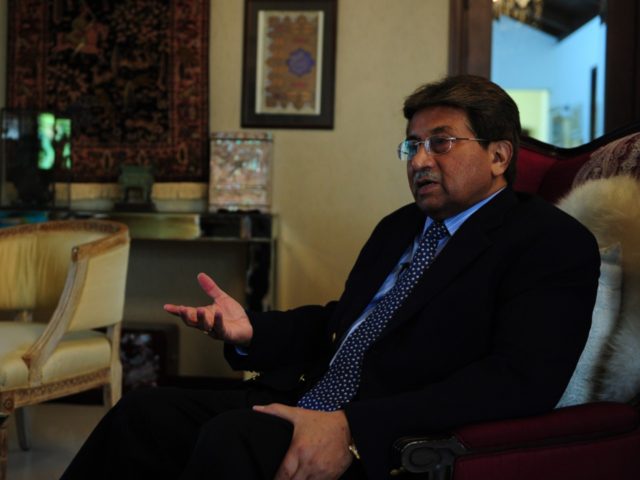A court in Pakistan sentenced former President Pervez Musharraf to death on Tuesday for imprisoning top judges in 2007 as part of a “state of emergency” meant to keep him in power.
The move failed, Musharraf resigned in 2008, and his political opponents have been attempting to organize a legal case against him ever since. Musharraf, a general, took power from predecessor Nawaz Sharif in a military coup in 1999 and served as head of state for nine years.
A special tribunal to address Musharraf’s crimes found him guilty of treason for placing judges under house arrest to prevent them from finding his “state of emergency” unconstitutional. The three high judges reviewing the case found that Musharraf’s actions fit the constitutional definition of treason as working to “abrogate or subvert or suspend or hold in abeyance the Constitution by use of force.”
The judges chose to sentence Musharraf to death instead of the alternative punishment proscribed, life imprisonment.
Musharraf has lived abroad since 2013. He fled the country in 2008 to allegedly receive medical care, then returned for a failed attempt to place himself on the ballot in 2013 – triggering criminal legal action against him, which he responded to by moving to Dubai, United Arab Emirates, and spending some time in London. Sharif won the election for prime minister that year.
Musharraf’s tenure in which the president of the country served as head of government was a deviation from the modern use of the prime minister’s office as the top job.
The Pakistani newspaper Dawn reported that the verdict against Musharraf is unprecedented and courts will likely use it in the future in other cases of abuse of power by head of state. It is the product of legal procedures that began in 2013, when Sharif returned to power, which specifically targeted Musharraf’s behavior in 2007, not his illegal takeover of the country from Sharif in 1999. The newspaper noted that appeals during the past 6 years had stalled the legal procedure, ultimately delaying the verdict even at the last minute, as the court had prepared to issue its death sentence in late November.
While the court ruled in favor of the prosecution, Dawn reports that the three presiding judges appeared to lose patience with the prosecutors on several occasions, particularly in light of demands to introduce three more people into the case.
“Submitting such a request after three and a half years means the government doesn’t have the right intentions. Today the case was set for final arguments and now new petitions have been submitted,” Justice Shahid Karim responded to the request, later ordering exasperatedly, “If you want to further make anyone a suspect, submit a new case.”
Another judge, Justice Nazar Akbar, chided the prosecutors, “Your purpose was just to get through today.”
Musharraf’s legal team can appeal the special court, extending the process. Musharraf himself did not participate in the legal process or testify as he is in Dubai, which makes it unlikely that he will have to endure the sentence the court handed him. UAE and Pakistan do not have an agreement that would require Musharraf’s arrest and extradition.
Musharraf published a video from a hospital in Dubai in early December in anticipation of the verdict in which he denounced the case as “absolutely baseless.”
“I have served my country for 10 years. I have fought for my country. This [treason] is the case in which I have not been heard and I have been victimized,” he said in the video.
The Pakistani military, handed the first such verdict for treason against one of their own, reacted with outrage.
“An ex-Army Chief, Chairman Joint Chief of Staff Committee and President of Pakistan, who has served the country for over 40 years, fought wars for the defense of the country can surely never be a traitor,” DG ISPR Major General Asif Ghafoor said in a statement representing the armed forces. “Due legal process seems to have been ignored including constitution of special court denial of fundamental right of self-defense, undertaking individual specific proceedings, and concluding the case in haste.”
Representatives of opposition political parties applauded the move.
“If this judgment had come 50 years before, then the black-tradition of martial law would not have been set and East Pakistan would still be with us,” Pakistan Peoples Party (PPP) chairman Bilawal Bhutto said following the verdict. The head of the Pakistan Muslim League-Nawaz (PML-N),” Sharif’s party, also heralded the move.
Islamabad Fahd Husain, editor of Dawn, also described the verdict positively, as it “establishes a very strong legal deterrence against future interventions in which the constitution can be suspended. In this way it strengthens constitutional democracy in Pakistan.”
“It is clear that the sentence will not be implemented any time soon. The significance lies in the very fact that such a sentence has been handed down,” he added.
Nawaz Sharif is in London for alleged medical treatment following a Pakistani court sentencing him to ten years in prison on corruption charges.
Musharraf took over Pakistan shortly before, and presided over the aftermath, of the September 11, 2001, attack, painting himself as a moderate ally of the United States against radical Islamic forces. Following his resignation, Secretary of State Condoleezza Rice referred to him as a “friend to the United States and one of the world’s most committed partners in the war against terrorism and extremism.” Musharraf reportedly agreed to allow American forces to enter the country and engage in military activity against al-Qaeda in late 2001, reports revealed following the U.S. operation to capture and kill Osama bin Laden in the suburb of Abbottabad, Pakistan. Bin Laden, a Saudi native, nonetheless successfully lived in a populated area of the country unperturbed for over a decade following the attacks, suggesting some in the Pakistani government protected him.

COMMENTS
Please let us know if you're having issues with commenting.